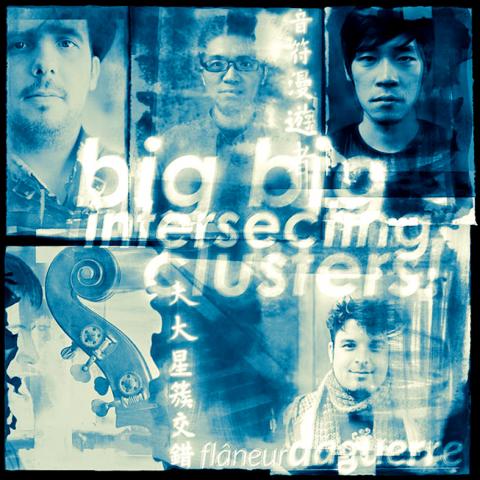Andrew Page is an American expat concert pianist based in Taiwan, and an active participant in the local jazz scene as music director for the American Club in Taipei.
The 29-year-old’s debut CD, Sketches and Suites, reflects his formal training in both jazz and classical music. This collection of several dozen solo works on acoustic piano live up to the album’s title in form and function.
The album has a strong impressionistic feel with a contemplative, meandering tone set by tracks like Drip Coffee, Water Blue, Reiki and Hommage a Debussy.

Many of the songs are improvised pieces averaging one to two minutes long, a fact that, coupled with the collection of quirky titles (Bicycle, Sulfur Bubbles, After Lunch Hymn), gives the album an audio scrapbook vibe.
Page told the Taipei Times in an interview that his goal was to create “musical pictures” from the “sketches in my head.” This is evident in Primary Blocks Suite, which he calls a musical interpretation of the primary colors. This piece exemplifies Page’s penchant for translating images into sound, as his playing is full of splashing scale runs, pounding chords and angular harmonies.
There’s a similar playfulness in songs like Small City Suite, which begins with a jazzy walking bass line and builds into lush chordal harmonies, and Broken Bossa Suite, in which Page takes a gently funky bossa nova beat and gives it a jolt.

Page isn’t out to create mischief, though. Overall he favors tone and color in these recordings but never falls into emotional melodrama. As a whole, these pieces are brisk and light, and hang together loosely like a collection of notes from a personal journal, created with a pianist’s amusement in mind.
This EP is not a retrospective as the title suggests. Twenty-six-year-old indie rock singer/songwriter Ben Ben (斑斑), real name Lin I-le (林以樂), told the Taipei Times in a brief interview that “1984-2011” was a reference to a past boyfriend (who was born in 1984). Yet this six-song EP isn’t really about him, she says.
The music lives up to the other half of the title. The songs were recorded live, and will certainly please Ben Ben’s fans, who rightfully adore her work. She is the driving voice behind the brilliant noise/art-rock band Boyz & Girl, and recently finished a stint as drummer for the acclaimed Beijing indie group Carsick Cars. Lin debuted her solo material last year as Skip Skip Ben Ben with No Fi, No Fiction, a lo-fi experimental album filled with looped noise and freaky folk rock.

Live/1984-2011 turns back to more straightforward post-punk rock, with Ben Ben backed by “Dead Couple,” a temporary band composed of Boyz & Girl bandmate Luo Chun-long (羅準龍) on bass and Ho Min (何忞) on drums.
One thing this EP shares in common with Boyz & Girl’s self-titled album is a semi-spooky, cavernous aesthetic. Ben Ben likes reverb and she knows how to use it, whether it’s using the effect to make her pipsqueak voice sound distant and ghostly instead of childish (Parking, Walkman) or to enhance a late 1960s-sounding psychedelic jungle rock groove (Yeah Yeah Yeah).
The EP packaging is another example of how Ben Ben charms her fans. She sold the EP as a limited edition of 200 copies, burning the CDs herself and making an individual package for each one. The copy I received was DIY to the core, from the handmade cardboard case with office-supply stickers spelling out her name to the CD itself, on which she wrote the title and drew a quick self-portrait with a green magic marker. Unfortunately, physical copies are no longer available, but you can still purchase the tracks on indievox.com.
But what really stands out in the end is Ben Ben’s sense of songcraft. Her lyrics are often inaudible (you can’t always tell if she’s singing in Chinese or English), but structurally, her music has a simple elegance. She doesn’t just play around with noise, like many “experimental” bands seem to do; she tends to wield it, hone it, shape it into something with a clear form. Whether it’s a noise-rock piece on No Fi or a gloomy, dreamy rocker like the EP closer, Ear Too Hurts Pants Too Tied, Skip Skip Ben Ben rarely fails to leave a lasting impression.
Who says that modern jazz can’t be fun? That’s one idea behind this playful debut album from Taipei-based jazz quintet Flaneur Daguerre. The group, formed by American expat musician Louis Goldford, thrives on putting seemingly disparate elements together, whether it’s differing tempos, melodies or musical styles.
The album opener, Imbroglio, is described in the liner notes as an “embarrassing clash between a scale and a melody that doesn’t quite fit.” But therein lies the charm of the song, which is presented as a tribute to avant-garde jazz musician Steve Lacy — the dissonance in the piece melts away as a structure takes shape.
Another side to the band’s mash-up approach is Mrs. M. Milkoholic, in which drummer Lin Wei-chung (林偉中) tries to sabotage the main theme, a quaint ragtime melody played by pianist Martijn Vanbuel, by trying to incorporate a rock beat. The most enjoyable part of this piece is listening to how Vanbuel barely keeps it together as his bandmates try to throw him off.
The band keeps a straight face on Chase Music Without a Scene, which sounds like a 1970s detective flick soundtrack hijacked by free jazz musicians and features an excellent performance by Goldford on soprano saxophone.
Another distinctive voice on the album is that of accordion player Lio Pinard, whose instrument fits perfectly in tunes like Circus Song, which twists and warps stereotypical circus music and the tempo-shifting Contrapunctus. Pinard’s own composition Childish, which starts with a gypsy-esque melody that transforms into a bop-flavored jam, is aptly described in the liner notes: “Don’t listen to Freud ... go for the childish boogie.”
The album is laced with sound-clip interludes that include sardonic commentary from a fake radio DJ, a self-mocking piece called Too Many Accordions and a soundscape recording of sounds from a night market that closes the album.
Beneath the humor, Flaneur Daguerre is driven by some academic ideas. Goldford, who has a background in both music and economics, is an ardent reader of the early 20th-century German philosopher and social theorist Walter Benjamin. Benjamin wrote about the flaneurs, who were members of the bourgeoisie who wandered the streets of 19th-century Paris observing culture from a distance.
That idea inspired Goldford to start the group (the band’s name and album title are also references to Benjamin’s writings). In an essay printed in the CD liner notes, Goldford likens Flaneur Daguerre’s music to a “montage” made from a collection of musical snippets from different historical and stylistic contexts.
Goldford’s essay offers some interesting insights on modern music in general, but it’s not light reading. He dives into Benjamin’s esoteric theories about art and photography, and how it relates to the band’s music.
These ideas might come across as lofty or obtuse for general readers and listeners. But fortunately, you don’t need the notes to enjoy the music, which is very accessible and speaks for itself.